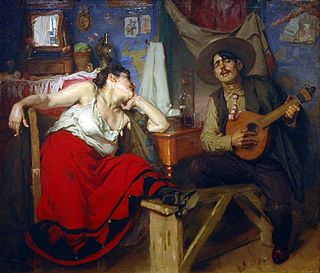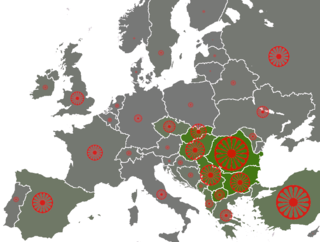
The Romani, also spelled Romany or Rromani, colloquially known as the Roma, are an Indo-Aryan ethnic group who traditionally lived a nomadic, itinerant lifestyle. Linguistic and genetic evidence suggests that the Romani originated in the Indian subcontinent; in particular, the region of Rajasthan. Their subsequent westward migration, possibly in waves, is now believed to have occurred by historians around 1000 CE. Their original name may have been "Doma". The Doma (Roma) population moved west into the Persian Ghaznavid Empire and later into the Byzantine Empire. The Doma/Roma arrived in Europe around the 14th century. Although they are dispersed, their most concentrated populations are located in Europe, especially central, eastern and southern Europe, as well as western Asia.

Fado is a music genre that can be traced to the 1820s in Lisbon, Portugal, but probably has much earlier origins. Fado historian and scholar Rui Vieira Nery states that "the only reliable information on the history of fado was orally transmitted and goes back to the 1820s and 1830s at best. But even that information was frequently modified within the generational transmission process that made it reach us today."

The Sinti are a subgroup of Romani people, found mostly in Germany and Central Europe, numbering some 200,000 people. They were traditionally itinerant, but today only a small percentage of Sinti remain unsettled. In earlier times, they frequently lived on the outskirts of communities.
Calo, Caló, or Calò may refer to:
Caló is a language spoken by the Spanish and Portuguese Romani. It is a mixed language based on Romance grammar, with an adstratum of Romani lexical items through language shift by the Romani community. It is often used as an argot, a secret language for discreet communication amongst Iberian Romani. Catalan, Galician, Portuguese, and Spanish caló are closely related varieties that share a common root.
The Romani in Spain, generally known by the endonym Calé, or the exonym gitanos, belong to the Iberian Romani subgroup known as Calé, with smaller populations in Portugal and in Southern France. Their sense of identity and cohesion stems from their shared value system, expressed among the gitanos as the leyes gitanas.

Bye Bye Brazil is a 1979 Brazilian-French-Argentine film, directed by Carlos Diegues.

The Romani people have several distinct populations, the largest being the Roma and the Calé, who reached Anatolia and the Balkans in the early 12th century, from a migration out of the Indian subcontinent beginning about 1st century – 2nd century AD. They settled in the areas of present-day Turkey, Greece, Serbia, Romania, Croatia, Moldova, Bulgaria, North Macedonia, Hungary, Albania, Kosovo, Bosnia and Herzegovina, Czech Republic, Slovenia and Slovakia, by order of volume, and Spain. From the Balkans, they migrated throughout Europe and, in the nineteenth and later centuries, to the Americas. The Roma population in the United States is estimated at more than one million.
An anti-discrimination law was published on 28 August 1999. It prohibits discriminatory practices based on race, skin colour, nationality and ethnic origin. According to the Portuguese Constitution, further discriminatory practices based on sex, race, language, origin territory, religion, political and ideological convictions, instruction level, economic situation, social condition or sexual orientation are also prohibited.
David Bonneville is a film director and screenwriter of French and British descent.

The Romani people are also known by a variety of other names; in English as gypsies or gipsies, and Roma; in Greek as γύφτοι (gíftoi) or τσιγγάνοι (tsiggánoi), in Central and Eastern Europe as Tsingani ; in France as gitans besides the dated terms bohémiens and manouches; in Italy as rom and sinti besides the dated terms zingari, zigani, and gitani; in Spain as gitanos; and in Portugal as ciganos.

The Romani people in Portugal, known in spoken Portuguese as ciganos, but also alternatively known as calés, calós, and boémios, are a minority ethnic group. The exact numbers of Romani people in the country are unknown—estimates vary from 30,000 to 50,000.
Luiz Carlos Dórea Barreto is a boxing and mixed martial arts trainer from Brazil and is also a retired boxer. He trained many boxers like Acelino Freitas, Éverton Lopes and Adriana Araújo and mixed martial artists like Anderson Silva, Junior dos Santos, Antônio Rodrigo Nogueira and Antônio Rogério Nogueira.
The Brazilian Bridge Federation is the national organization for bridge in Brazil and a member of the Confederacion Sudamericana de Bridge and the World Bridge Federation. It was founded in 1945 as the Confederação Brasileira de Bridge, affiliated with the World Bridge Federation in 1979, and fully recognized by it in June 1999.
The Romani people in Brazil are known by non-Romani Brazilians as ciganos, or alternatively by terms such as boêmios, judeus and quicos, in various degrees of accuracy of use and etymology as well as linguistic prestige.

Darlan Romani is a Brazilian track and field athlete specialising in the shot put. Indoor World Champion in 2022, he also finished 4th at the 2020 Olympic Games, 4th at the 2019 World Championships, and was champion of the 2019 Pan American Games.
O Rei dos Ciganos is a Brazilian telenovela produced and broadcast by TV Globo. It premiered on 12 September 1966 and ended on 20 February 1967. It's the second "novela das oito" to be aired on the timeslot.

Chega is a national conservative, right-wing populist political party in Portugal formed in 2019 by André Ventura. It is characterized as being between the right-wing and far-right of the political spectrum.
Carlos Manuel Soares Miguel is a Portuguese lawyer and politician serving as Deputy Minister for Regional Development in Prime Minister António Costa's second cabinet. Previously he was Secretary of State for Local Administration in Costa's first cabinet and Mayor of Torres Vedras. He is the first person of Romani ethnicity to become a cabinet member in Portugal.








